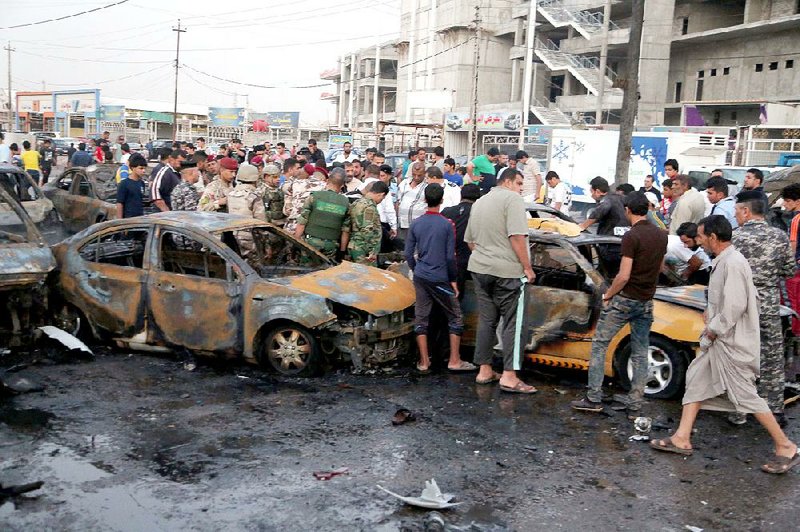BAGHDAD -- Iraqi officials said Friday that they believe government forces killed Izzat Ibrahim al-Douri, the former deputy of Saddam Hussein who for more than a decade was the top fugitive from the ousted regime.
Al-Douri became an underground figure involved in Sunni insurgencies, most recently allying with Islamic State militants.
It was not the first time Iraqi officials have claimed to have killed or captured al-Douri, who was the "king of clubs" in the deck of playing cards issued to help American troops identify key regime fugitives after the 2003 U.S.-led invasion ousted Saddam. DNA tests were underway to confirm whether a body recovered from fighting around the city of Tikrit was al-Douri's.
Reports of al-Douri's death came as Iraqi forces are trying to push back Islamic State fighters in Salahuddin province, where Tikrit is located. Government troops took back several towns near the country's largest oil refinery at Beiji in the province, officials said.
Farther north, a car bomb exploded Friday afternoon next to the U.S. Consulate in the northern city of Irbil, a rare attack in the capital of the Kurdish autonomous zone. Iraqi police officials said three people were killed and five were wounded in the bombing. U.S. officials said there were no American casualties or casualties among consulate personnel or guards.
The Islamic State claimed responsibility for the Irbil attack, according to the SITE Intelligence Group, which tracks militant websites.
According to the governor of Salahuddin province, Raed al-Jabouri, al-Douri was killed by Iraqi troops and Shiite militiamen in an operation in the Talal Hamreen mountains east of Tikrit, Saddam's hometown, which was retaken from the Islamic State earlier this month.
Troops opened fire at a convoy carrying al-Douri and nine bodyguards, killing all of them, Gen. Haider al-Basri, a senior Iraqi commander, told state TV.
The government issued several photos showing a body said to be that of al-Douri. The body had a bright red beard and a ginger-colored moustache. Al-Douri was a fair-skinned redhead with a ginger moustache, making him distinctive among Saddam's inner circle.
DNA tests were underway to confirm the identity of the body, Iraqi intelligence officials said, speaking on condition of anonymity because they were not authorized to talk to the media.
In 2013, the Iraqi government said it had arrested al-Douri, circulating a photo of a bearded man who resembled the former Baathist. It later said it was a case of mistaken identity.
Col. Pat Ryder, spokesman for U.S. Central Command, said the U.S. has no information to corroborate the reported death of al-Douri.
Al-Douri was officially the No. 2 man in Iraq's ruling hierarchy. He served as vice chairman of Saddam's Revolutionary Command Council and was one of Saddam's few longtime confidants. His daughter was married briefly to Saddam's son, Odai, who was killed with his brother, Qusai, by U.S. troops in Mosul.
When Saddam's Baathist regime collapsed as U.S. troops occupied Baghdad, al-Douri disappeared. He was No. 6 on the most-wanted list of 55 Iraqis after the invasion. When Saddam was killed months later and more regime figures were caught, al-Douri became the most prominent fugitive.
U.S. authorities soon linked him to the Sunni insurgencies that broke out against the American occupation and the Shiite-led government that replaced Saddam.
Early in the war, U.S. authorities linked al-Douri to Ansar al-Islam, a militant group with ties to al-Qaida, and he was accused of being a major financier of the insurgency. Sunni former officers from Saddam's military and police were believed to have played large roles in the insurgency, whether with al-Qaida or other factions.
Al-Douri later emerged as a leader of the shadowy Army of the Men of the Naqshabandi Order. The group depicts itself as a nationalist force defending Iraq's Sunni minority from Shiite rule and as an alternative to the extremist version of Islam championed by al-Qaida.
Last year, when the Islamic State -- the successor to al-Qaida's branch in Iraq -- launched a blitz across much of western and northern Iraq, al-Douri, the Naqshabandi group and other former Saddam-era officers reportedly entered a shaky alliance with it.
When Tikrit was overrun by the Sunni militant group last June, witnesses said fighters raised posters of Saddam and al-Douri. Fighters loyal to his Naqshabandi group as well as former members of Saddam's Baath Party were the main militant force in Tikrit at the time of its capture, residents said.
Still, the Naqshabandi group criticized Islamic State atrocities, including the persecution of religious minority groups and the burning of a Jordanian coalition pilot in Syria.
Iraqi security forces recaptured al-Douri's hometown of Dawr in March as part of its large-scale offensive to retake Tikrit. Government forces seized control of Tikrit on April 1.
Information for this article was contributed by Sameer N. Yacoub, Bram Janssen and Matthew Lee of The Associated Press.
A Section on 04/18/2015

